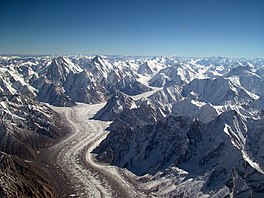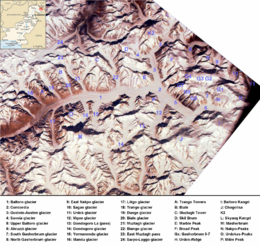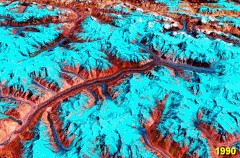Baltoro Glacier
| Baltoro Glacier | |
|---|---|
| བལྟོརོ་གངས། | |
 The Baltoro Glacier from the air, looking east | |
| Type | Mountain glacier |
| Location | Karakoram range, Gilgit-Baltistan |
| Coordinates | 35°44′11″N 76°22′51″E / 35.73639°N 76.38083°E |
| Length | 63 kilometres (39 mi) |
 | |
The Baltoro Glacier (Balti: བལྟོརོ་གངས།, romanized: Baltoro gangs, lit. 'Bone breaker';[1] Urdu: بالتورو گلیشیر) is a glacier located in the Shigar District of the Gilgit-Baltistan region in Pakistan. It stretches for 63 km (39 mi) in length. It is one of the longest glaciers outside the polar regions. It is home to some of the world’s highest mountains. It runs through the Karakoram mountain range, close to K2, which is the second highest peak in the world, reaching an elevation of 8,611 meters (28,251 feet). Within a 20-kilometer radius, there are three more mountains with elevations exceeding 8,000 meters.[2]
Geography
[edit]
It is located within the Shigar District of the Gilgit-Baltistan region of Pakistan. The Baltoro Glacier flows through a section of the Karakoram mountain range, bordered by the Baltoro Muztagh to the north and east, and the Masherbrum Mountains to the south. The region boasts K2 as its tallest peak, standing at 8,611 meters (28,251 feet) in elevation, with three additional mountains exceeding 8,000 meters within a 20-kilometer radius.[3] Separated from the Baltoro Glacier by the Conway Saddle (or pass) is the Siachen Glacier.[4][5]
The Baltoro Glacier serves as the source of the Braldo River, which, in turn, flows into the Shigar River as a tributary. The Shigar River, in its course, acts as a tributary to the Indus River. Several large tributary glaciers feed the main Baltoro Glacier, including the Godwin-Austen Glacier, flowing south from K2; the Abruzzi and the various Gasherbrum Glaciers, flowing from the Gasherbrum group of peaks; the Vigne Glacier, flowing from Chogolisa, and the Yermandendu Glacier, flowing from Masherbrum. The confluence of the main Baltoro Glacier with the Godwin-Austen Glacier is known as Concordia; this location and K2 base camp are popular trekking destinations.
The trough of this glacier is very wide. Small valley glaciers form icefalls where they meet the trunk glacier. The sidewalls vary from very steep to precipitous. The glacier has carved striations on the surrounding country rocks. Moving ice has formed depressions, which serve as basins for numerous glacial lakes.
The glacier can be approached via the Balti town of Skardu.
List of peaks
[edit]A list of notable peaks adjacent to or near the Baltoro Glacier includes:
- Biarchedi, 6,781 m
- Broad Peak, 12th highest in the world at 8,047 m.
- Chogolisa, 36th highest in the world at 7,665 m.
- Gasherbrum III, 7,946 m. (Often regarded as a subpeak of Gasherbrum II.)
- Gasherbrum II, 13th highest in the world at 8,035 m.
- Gasherbrum IV, 17th highest in the world at 7,932 m.
- Gasherbrum I, 11th highest in the world at 8,080 m.
- K2, 2nd highest in the world at 8611m
- Masherbrum (K1), 22nd highest in the world at 7,821 m.
- Mitre Peak, 6,010 m.
- Muztagh Tower, 7,273 m.
- Snow Dome, 7,160 m.
- Trango Towers, 6,286 m. (Their vertical faces are the world's tallest cliffs.)
- Uli Biaho Tower, 6,417 m.
Image gallery
[edit]-
Looking NE towards K2, at top centre
-
Close-up photo of the glacier
-
View of the Baltoro Glacier from Urdukas campsite
-
A glacial mushroom on Baltoro Glacier
See also
[edit]- Baltoro Muztagh
- Biafo Glacier
- Trango Glacier
- Hainablak Glacier
- Sarpo Laggo Glacier
- Eight-thousander
- List of glaciers
- List of highest mountains
- Northern Areas
References
[edit]- ^ Iqbal, Vasiq (2016-09-04). "The frozen lake that does not reflect anything". DAWN.COM. Retrieved 2023-02-17.
- ^ The Fedchenko Glacier in the Pamir Mountains of Tajikistan is 77 km long, the Siachen Glacier which lies southeast of the Baltoro is 70 km long, and the Biafo Glacier to the northwest of the Baltoro is 67 km long. Exact lengths are relatively easy to determine with modern maps and imagery so as to include recent glacial retreat. Measurements are from recent imagery, generally supplemented with Russian 1:200,000 scale topographic mapping as well as Jerzy Wala,Orographical Sketch Map: Karakoram: Sheets 1 & 2, Swiss Foundation for Alpine Research, Zurich, 1990.
- ^ Concordia K2 Trek
- ^ "Siachen: Death (and some glory) at 20,000 ft Explained". 12 February 2016.
- ^ "The Shooting's Over But Siachen Will Keep Taking Its Toll".








